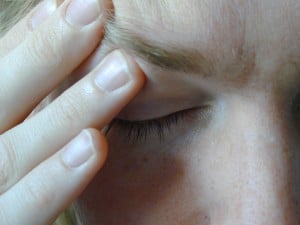
Source: Getty Images
It happens to all of us.
Those days when you put on your gym clothes, ready to hop out the door and into your work out routine, but just can’t shake the feeling of inadequacy as you lace up your running shoes.
Or those days when your alarm goes off and the first thought that pops into your barely-awake mind is why you still feel bloated from the pizza that you ate last night, wondering why eight hours of sleep wasn’t enough to make the food baby go away.
Or, maybe more often than not, those nights when your anxiety is so high that you cancel plans with your friends to go out to The Cheesecake Factory, making up some bogus excuse so that you don’t have to admit the truth.
That moment of sudden panic when you realize that you’ve heard these voices in your head before, that no matter how hard you try to make them vanish, sometimes they still call to you.
Sometimes, your eating disorder creeps back up.
And the truth is: Staying in recovery from an eating disorder can be a really difficult task.
Trust me, I know.
The fear of relapse seems like it’s always lurking in the corner, ready to gobble you up as soon as you have a moment of weakness, especially when you’re in a period of stress or anxiety in your life.
And to top it off, the added stress of a possible relapse only makes you feel worse, adding to the likelihood of relapse. It’s like the worst cycle ever.
And yet, it’s not something that we talk about enough – not even in the eating disorder recovery community.
We talk about our past struggles. And we talk about our daily triumphs. But how often do we talk about the days when we’re so disgusted with ourselves, we can hardly get out of bed?
How often do we admit fully – and no, subtweeting to your ED doesn’t count – TODAY FUCKING SUCKED, AND I THOUGHT I WAS OVER THIS ALREADY.
And how often do we give one another advice on how to overcome it?
I, for one, don’t do it nearly enough.
So here’s my reconciliation.
1. First of All: Breathe
Seriously. Take a breath.
Or two. Or three. Or have a whole damn meditation session until your heart stops beating so fast.
Because the best way to keep yourself from relapsing into old habits (which, as they say, die hard) is to remove yourself from the mindset that’s causing your anxiety in the first place.
Personally, my favorite breathing exercise is called nadi shodhana – a cleansing, purifying breath of the nostril pathways. It creates a calming effect.
But you can choose any kind of breath that suits you.
The important thing is, in the words of Jane Fonda on all of my mom’s work-out VHS tapes from the late 1980’s and early 1990’s: Don’t forget to breathe.
2. Let Yourself Relax
Take your mind off of your anxiety and do something to relax you instead.
If you can get yourself out of your anxious mood, then you’ll be better equipped to deal with your feelings of wanting to resort to the coping mechanisms of disordered eating behavior.
Here are ten ideas for what you can do to give yourself time to relax:
- Make a cup of tea. Drink it slowly.
- Take a bath. A hot one. With bubbles. A shower with aromatherapy works, too.
- Do arts and crafts. Make someone a card. Or color a page in a coloring book.
- Cook or bake something. Don’t worry yourself with whether or not you’ll have to eat it. Just make it.
- Put on some of your favorite music and thrash around the room. Or perform for yourself in the mirror.
- Meditate. Lie down, close your eyes, and refocus your attention. Or practice a few yoga poses.
- Take a walk. Leave your phone and iPod at home. Take in all that you see, hear, and feel. Don’t go back home until you feel a little better.
- Organize. Alphabetize your books or CD’s. Clean out your closet. Wash the kitchen or bathroom.
- Go for a nice, long drive. Listen to one of your favorite artists. (Personally, I always opt for Kanye West’s 808’s and Heartbreaks.)
- Have a good cry. The world always looks a little brighter after expunging emotion like that.
Do anything that’s just for you.
Self-care is an act of revolution in a world that constantly tells you that you’re not worthy of happiness.
And now that you’re back at ground zero, you can start over.
Sometimes, this is enough.
Sometimes that’s all you need to keep yourself from falling back into a bad situation.
And you can even make your own list of awesome ideas for how to deal with your anxious feelings. That way, whenever you’re feeling like relapsing, you can check the list and do one of the things there instead.
3. Practice Intentional Thought
Part of what makes eating disordered thoughts so difficult to handle is that they’re largely out of your control.
They pop up when you least expect them, taking you by surprise.
And unless you’ve developed a game plan for what to do when that does happen, sometimes, they can completely overtake you. They hijack your brain!
So take back your rational thought.
This can be uncomfortable, but sometimes the best way to do this is to sit with it.
Let yourself think the irrational thought.
And then intentionally ask yourself: Why am I thinking this? Does anything about this make actual sense, or is it just distorted by my eating disorder? What is the truth? And how can I teach myself to remember the truth for next time?
One great example – and I know that a lot of you out there can sympathize with this – is when, after eating a particularly high-calorie meal, your eating disorder slips in to try to convince you that now you’re going to gain five pounds.
From one slice of cheesecake.
And that feeling of dread and guilt feels so real, so legitimate that sometimes we forget to question it.
But when you sit down and think about it, you know for a fact that 1) no, you will not gain five pounds in one sitting; 2) the concept of five pounds isn’t actually frightening in the first place; and 3) you’re only thinking this in the first place because you have an eating disorder – a mental illness – and you cannot let irrational thoughts control you.
And sometimes, once you remember the truth, you feel a little bit better.
Rational thought, 1. Eating disorder, 0.
4. Find (and Rely On) a Support System
One of the most important elements in successful eating disorder recovery is having a support system on which you can rely.
This support system should consist of friends, family, medical and mental health professionals, and other resources.
It is vital that you do not rely on one person for support. No one person can carry that burden for you. Spread it out, and you’ll find that a network is better able support you.
Do you have a friend who is also in eating disorder recovery (and not currently feeling triggered)? Do you have an aunt who has been very understanding of your process? Are you currently seeing a nutritionist or therapist who you can confide in? Is there a support group in your area where you can attend meetings?
Use the resources that you have. That’s what they’re there for.
And if people aren’t sure how to help you, let them know.
And remember that you can find support, sympathy, and inspiration in online communities as well.
On Tumblr, for instance, there are tons of recovery-specific blogs to follow. It’s a good way to build community, to feel less alone, and to feel inspired, given what other people are going through.
Some of my personal favorite positive recovery blogs are Recovery Is Beautiful, Life Without ED, and The Love Yourself Challenge.
They offer posts to boost positivity, facts about eating disorders and other mental illnesses, tips and tricks for dealing with relapse fears, and also help and support if you want to write in.
There are also great anti-thinspiration blogs that are helpful in recovery (in that they can help reshape your ideas about beauty and perfection) like Curve Appeal, Say No to Thinspo, and We Are Anti-Thinspo.
I also highly recommend checking out Arielle Lee Bair and her YourTube channel Actively Arielle: A Voice with a Commitment here.
She’s a friend of mine, an eating disorder survivor and specialist, and all-around amazing person who posts weekly videos about recovery. Scroll through her archive to see if you can find topics that pertain to exactly what you need right now.
You are not alone in this.
5. Recognize When You Need Medical Attention
If your feelings of relapse are recurring, and you feel like they’re coming to a head, then it might be time to take more proactive action, like talking to your primary care physician, a nutritionist, or a mental health professional — or even a counselor at school or at a community organization.
Explain your situation. Let them know that you’ve suffered from an eating disorder in the past and that you feel a relapse coming on.
See if you can get medical and psychological attention as an intervention.
There are plenty of options out there for you, including therapy and medication. A medical professional can help you come up with the best option for you based on your needs and preferences.
You can look into the network over at the National Eating Disorders Association (NEDA) for information on how and where to get help, and you can call their toll-free hotline whenever you need immediate assistance during business hours: 1.800.931.2237.
—
Remember that relapse is not failure and that asking for help when you need it is bravery, now cowardice.
You are bigger and better than your eating disorder, and you can get through this.
There’s always tomorrow. Tomorrow is a new day.
Want to discuss this further? Login to our online forum and start a post! If you’re not already registered as a forum user, please register first here.
Melissa A. Fabello is the Editor at Everyday Feminism. She’s a feminist blogger and vlogger, as well as an online peer sex educator, based out of Philadelphia. She is a second-year graduate student, working on an M.Ed. in Human Sexuality. She can be reached on Twitter @fyeahmfabello and Tumblr. Read her articles here and book her for speaking engagements here.
Search our 3000+ articles!
Read our articles about:
Our online racial justice training
Used by hundreds of universities, non-profits, and businesses.
Click to learn more




















